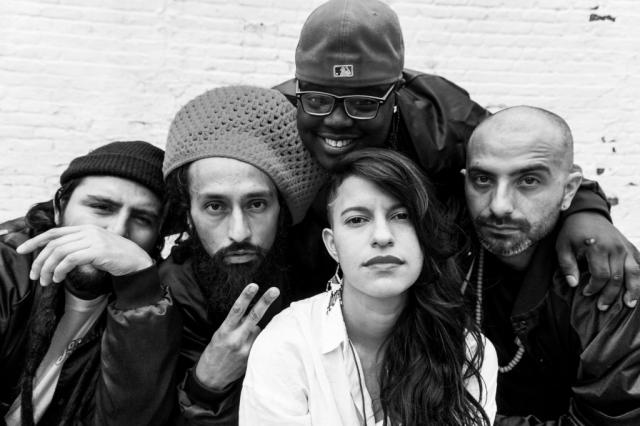Global Beat: M.A.K.U. Soundsystem

“I want to make fire,” guitarist Camilo Rodriguez says of the guiding principle that unites M.A.K.U. Soundsystem’s multicultural tales of struggle and rebirth. “I want to make music that burns, that is a response to what’s happening, with a sense of urgency.”
At their core, the New York-based band, most of whom are Colombian-born, play dance music that honors their roots while also taking on issues of immigrant rights, environmentalism and justice for marginalized communities. The project’s new EP, 5 Fuegos, is the first to feature their recently stripped-down lineup, after slimming down from an eight-piece with synth and horns to a more nimble quintet configuration.
M.A.K.U formed in 2010 when Rodriguez recruited a few musicians to help round out a set of songs he was working on by himself. Those initial recordings ended up becoming M.A.K.U Soundsystem’s debut LP, and the blueprint for band’s distinctive Afrobeat-and-cumbia-flavored sound. Elements of hip-hop, dancehall and Caribbean parade music creep into the mix; the vocals are sometimes sung and sometimes barked, as if through a loudspeaker, to deliver maximum impact. The band also throw in splashes of New York-style global eclecticism, ranging from klezmer clarinet to a frenetic, jazz-metal mash-up of accents and rapid-fire riffs.
Liliana Conde splits vocal duties and plays percussion in M.A.K.U. She’s sort of a halftime frontwoman for the group, carefully choosing moments to step into the background and let other band members drive the music. Conde came to the U.S. from Colombia when she was 12. Back home, she had attended a school that placed a strong focus on the arts, so she got an early foundation in music. She grew up in the northern city of Barranquilla, which is on the Caribbean coast and has a vibrant carnival culture.
Carnival cities—like Rio or New Orleans—tend to devote a significant amount of annual energy to the pre-Lenten festivals of excess and music. Their spirit permeates the life of the place year-round, even if it all culminates in one big blowout. In the U.S., Conde found herself missing that energy.
“I became very thirsty for anything having to do with Colombian music—for traditional music—because I was far from my culture,” she says.
At the same time, Conde, who was undocumented for part of her time here, was also in the midst of an awakening regarding politics and activism.
“I actually became politicized through music,” she says. “Growing up here as an immigrant, as an undocumented young person, it was kind of inevitable to be learning about justice, injustice and my role here.”
It was at about that time that Conde learned about the revolutionary music of Nigerian legend Fela Kuti. “I was just blown away because it was the kind of music that I was fascinated by. It was not just danceable, but it was also hypnotic.”
That mix of trance-inducing, body-moving polyrhythmic grooves and lyrics that are a call to action can be heard in M.A.K.U Soundsystem’s early music. There’s also a dose of psychedelic-garage-rock thrown into the mix. Listen to “Pow! Fire,” from the band’s 2011 record Makumbala. It sounds like Sun Ra and Lee Scratch Perry have joined forces and brought along a wild-eyed Caribbean orchestra, boasting some rippling organ sounds and ecstatic horns that give way to layers of percussion. Or check out “Agua,” the first track on their 2016 release Mezcla, a feverishly syncopated song about the unifying power of water—how it can’t be contained by walls or borders, and how our hearts and blood have a similarly wild and vital power.
“I’m on this journey to become more connected to the earth,” says Conde.
The band may have stripped away some of those dense layers of sound—Conde switched from playing a traditional Colombian drum to an electronic drum pad, which broadens some of the sonic possibilities—but they’ve retained their fascination with the elements. The new EP’s title translates to “five fires.” And M.A.K.U isn’t just interested in scorching flames for their light or heat or purifying powers. The EP is a quasi-concept album based in part on the idea of pyrophilic plants, some which have seeds that remain dormant until they’ve passed through the intense heat of a fire.
The 2016 U.S. presidential election created what she calls “a ridiculous political situation” that only served to make the grain of xenophobia in America more explicit. And music helps combat that.
“It can be really difficult to feel like we have the power to actually change something but, for me, the role that I see with music is in continuing to bring people together,” says Conde. “It’s almost like a call to action— instead of feeling too helpless and becoming pessimistic with all the things are happening in the world—the time is now, more than ever, to feed that energy into creation.”
This article originally appears in the September 2018 issue of Relix. For more features, interviews, album reviews and more, subscribe here.



















